On May 5, Bill Lochman died at the age of 82. We were friends for almost 70 years (obit here). A Celebration of Life will be held from 1 to 4 PM on Saturday, June 8, at the American Legion in Independence (16701 E. US Hwy 40).
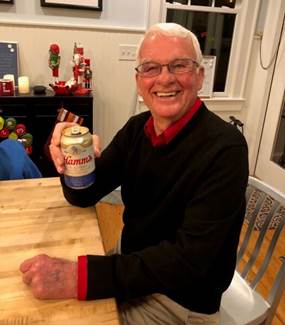
This is not the first time I’ve written about Bill. In 2009, for our 50th high school class reunion, I wrote the original “Lonnie’s Jukebox,” a chronicle of our high school days in parallel with the rock ‘n’ roll music of the times. Bill, along with classmates Diana Sullivan and Shirley Maycock, were primary sources and fact-checkers for that piece. Bill’s escapades were some of the best stories. He has also made several appearances in my Hot Stove baseball newsletters, most recently in a Lonnie’s Jukebox on our teenage days in the Draggin’ Diplomats. So, some of what follows may sound familiar.
I met Bill in the fall of 1955. We were freshmen at the brand new Van Horn High School in Independence. We initially knew each other only casually, but he got my attention during our junior year. He arrived in class all banged up – he’d been in a serious car wreck. He was driving his mother’s new Plymouth (push-button transmission) at 80-mph when he skidded off the road and hit a tree. I don’t remember his exact injuries, but I remember the song he said was playing on his car radio when he hit the tree. “Lollipop” – the latest Top-10 hit by the Chordettes.
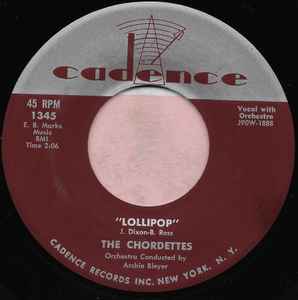
Bill became a much bigger part of my life during our senior year. Two primary reasons. Physics class and cars.
In physics class, I was a rule-follower and note-taker who did well on tests even though I did not comprehend the science. Bill was, let’s say, not academic. But he intuitively understood the science. I remember to this day when our teacher, Mr. Coleman, was introducing a subject about propulsion caused by the expulsion of air. I had no idea where this was going, but Bill blurted out “rocket.” Mr. Coleman was impressed, but wondered why Bill did not do better on tests. Well, that would require study, not Bill’s strong suit since he had a part time job and a 1950 Ford. Those ate up a lot of time.
So, I became Bill’s tutor. Not to teach him the science. To share my notes. This included meeting at his home where I met his mother Blanche (Mrs. Lochman to me). And it went well. Bill escaped physics with a passing grade.
Bill’s knowledge of rockets was theoretical. His knowledge of the internal combustion engine and all other things about cars was real. Although he sometimes exceeded the boundaries of that knowledge. Remember the tree he hit? Another example was a night when we left Van Horn Teen Town in his 1950 Ford. He floored the gas to build up some speed. To assure good rubber (squealing tires) in changing gears, he speed-shifted but never got to second gear – blew the transmission. I don’t remember what song was playing. That leads us to…
The Draggin’ Diplomats: As with many teenagers, my daily life abruptly changed when I got my own car, a 1954 Ford. Freedom. Out and about. Interested in custom cars and drag racing. A mentor was close by. Bill Lochman. He and Jim Graham (who I had known since early grade school) lured me to their hot rod club, the “Draggin’ Diplomats,” operating out of Larry Keck’s garage.
The club worked the tech line for the races at the dragstrip on Front Street. The dragstrip had been built by the city with the approval of the KC Police Department to discourage street racing. For the club’s cooperation in this effort, the police department awarded the club a Chrysler engine to use in a race car. The club bought a tiny 1948 Crosley sedan to house the big engine, but the car was never a big winner at the dragstrip.
The club members also actively worked on customizing their own cars. Some were even mechanically inclined and could repair our often-abused cars. They also had a cool custom front license plate:
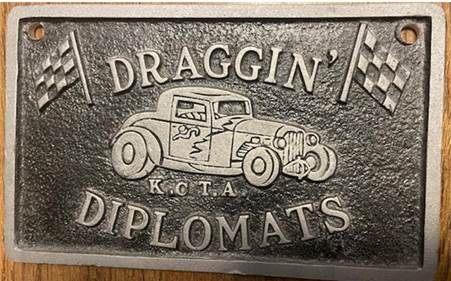
My mother was somewhat disappointed when she started seeing these new and different friends. It did not help when Bill was coming to pick me up one day. He was on Truman Road but in the wrong lane to make a right turn up my street. He cut off the driver in the right lane and sped up my street, but not before realizing that the driver he cut off was my dad. So, Bill did not stop at my house, and instead went around the block in the hope that dad would not notice it was him. Did not work. Dad was not happy. In the end, mom and dad grew very fond of Jim and Bill who would come by the house to visit while I was away at college.
Larry Keck continued to race for more than 35 years and moved on from street rods to dragsters. He was featured in a 1994 edition of “National Dragster,” where he perfectly summed up the nature of our old club: “Our club had about 15 members, but only two or three of us got greasy.” I was not one of those two or three but enjoyed the street rod and custom car scene. Graham and Lochman were not done with me – as soon as I got out of law school, they recruited me into their next social organization, the Young Democrats (about the same ratio of workers to party animals as in the Draggin’ Diplomats). More on that below.
Senior Year Story: Before the days of long spring breaks, we got a 4-day “Easter Holiday” from Good Friday through the following Monday. The drama class was preparing for their spring play, and rehearsals were planned for the holiday weekend. The male leads, Bill Lochman and Jim Tally, asked Miss Nanabel Cassell for permission to skip rehearsal so they could drive to Houston to see Bill’s girl friend who had just moved there. Miss Cassell said no, but of course they went anyway and ended up with car trouble in Corsicana, Texas – that same poor ‘50 Ford that had lost at least one transmission (photo below, not Bill’s car, but one similar).
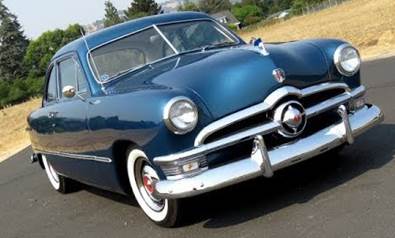
While buying parts so they could replace a piston on the side of the highway, they also acquired a tire, apparently without payment or permission. They fixed the car and went on to Houston, not realizing that their tire acquisition had been reported to the authorities. They unwisely returned by the same route and were stopped by the police and spent a night in the Corsicana jail.
Our good friends Diana Sullivan and Shirley Maycock were at a rehearsal during that weekend and reported that Miss Cassell asked a silent/grinning cast and crew where the leads were – someone finally broke down and told her they were in a Texas jail. Miss Cassell was not amused, but almost everyone else was – many substituting Corsicana for Tijuana and adding new lines to sing to the tune of the recently released Kingston Trio song, “The Tijuana Jail.”
[First Date History: Bill’s first date was with Shirley Maycock who he knew from church – the date was a fix-up by the respective mothers. I did not then know Bill, but I had met Shirley in class at Northeast Junior in the 8th grade. We both attended Teen Town, as did our mutual friend Diana Sullivan (I worked for Diana’s uncle at Curt’s Market). When the Teen Town formal dance was held, Shirley kindly agreed to be my first date. Neither first date led to regular dating, but Bill, Shirley, Diana and I remained lifelong friends.]
American Graffiti Summer: After graduation, we enjoyed a summer that was almost perfectly captured in the 1973 movie “American Graffiti.” I spent almost every night cruising with Lochman, Keck and Graham plus other friends from The Draggin’ Diplomats. One of the regulars was the outrageously funny Lonnie Offineer from the Class of ’61 (not to be confused with this Lonnie).
The Nu-Way and Starlight drive-in restaurants were part of the regular route, and late night meant the Trolley Inn on Truman Road or the Big Six, a diner on 24 Highway that had “Party Doll” on the jukebox. Mostly, we struck out on any major dating scene, but custom cars (often with Lancer hubcaps), the dragstrip down on Front Street and rock ‘n’ roll music filled in the non-work time.
My mind gets fuzzy on where we danced that summer (as opposed to the summer of ‘60 when I came back from college), but somewhere along the line we were meeting up with friends at the Promenade Ballroom at 31st and Main, the Coke Bar in Grandview and Barry’s Barn in Olathe.
We took a weekend trip to Wichita to see a big-time drag race. One of the participants was Kansas City’s Lou Cangelose who Bill and Jim knew from working the tech line at the KC dragstrip. They had also been to Lou’s house to purchase a used camshaft for the Chrysler engine going into the Crosley. They got the impression that Lou and the guys at the house were tied to the mob (and it turned out to be the case; see Hot Stove #245).
Lou drove a Chrysler-powered dragster (the “Missouri Missile”). His crew needed a push car to start the dragster for the race, and I agreed they could use my 1954 Ford. It’s the only photo I have of that car. I don’t remember how the race ended that day, but in 1965, Lou Cangelose was killed when his parachute failed to open after the Missouri Missile crossed the finish line at 198 mph.
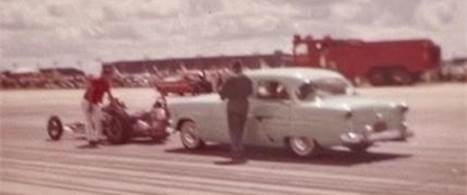
One aberration from our summer routine was prompted by the 1959 hit song “Kansas City” by Wilbert Harrison. “I’m gonna be standing on the corner, 12th Street and Vine…they got some crazy little women there and I’m going to get me one.” This naturally drew us in. Lochman, Graham, Offineer and I cruised through the entertainment district that stretched from 12th and Vine to 18th and Paseo. It looked like fun, so we parked and went into one of the clubs.
We were only 17/18 and rarely drank then. In the relaxed regulatory environment of the times, we were shown to a table next to the stage of the Blue Room (not today’s version near the Negro Leagues Baseball Museum, but the original in the now-gone Street Hotel). There we were, four white boys in tee shirts and jeans, in a club otherwise packed with Black customers dressed to the nines. Then the entertainment hit the stage. It was Dizzy Gillespie. Wow. We finished our one beer and left with a cool memory that we did not share with our parents.
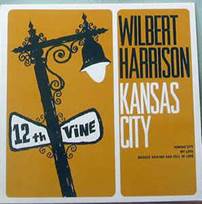 L
L
After the 1959 summer, I sold my Ford and headed to engineering school at Rolla where Sigma Nu Fraternity became my new home. Bill took some courses at UMKC. When I returned for the summer of 1960, we did an American Graffiti repeat of the summer of 1959. I bought a 1956 customized Chevy, and Bill and others from the club worked on it to add exhaust plugs, a tachometer, 4-barrel carburetor and a floor-shift transmission. Consistent with my skills, I mostly watched.
The Air Force: I went back to Rolla for my sophomore year and Bill headed to the Air Force. To the rockets. His station for most of his four years was in Minot, North Dakota. The main thing I remember about Bill’s letters to me at college was how devastatingly cold it was in Minot.
Minot was a key location in the missile race. After Sputnik was launched in 1957, one of the big worries was that the Russians were way ahead on rockets. Development was accelerated, and Minot became part of the Strategic Air Command. Some of the first Minuteman missiles were installed in silos in Minot during Bill’s service there.
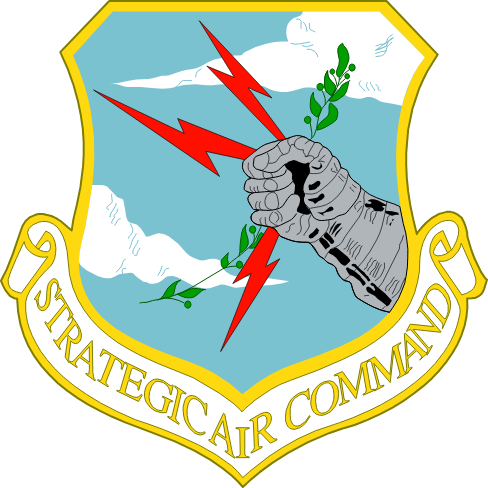
I have a copy of a letter I wrote to him in February of 1962. It is typewritten and addressed to “Mr. Yukon Bill” to reflect his cold surroundings. After I signed off at the end, I added a postscript, “Joke in Playboy for you rocket launchers.” I then wrote out the Playboy cartoon:

Bill’s knowledge about rockets was no longer just theoretical. Mr. Coleman would have been proud.
Next Chapter: In 1964, Bill and I returned to Kansas City. He had finished his four years in the service and went to work in the ad department at the Kansas City Star. I had finished getting my masters at Rolla and needed to deal with the reality that my lack of comprehension of physics and the inability to fix my car were early evidence that I should not pursue a career in engineering. So, I started law school at UMKC.
Bill and Larry Keck (who had a truck) moved me, my first wife Sharon and son Brian into our rental home. On September 3, Sharon entered the hospital to await delivery of our second child, estimated to occur sometime the next day. After visiting hours, I went out with Bill who told me he hoped an additional day would go by so the baby would be born on his birthday, September 5. Sharon delivered Stacey the next day, September 4. Although Bill did not get his wish, it was always easy for me to remember his birthday each year.
Jim Graham also joined the Air Force, and he too ended up on a missile base, but in the more temperate Wyoming. When Jim finished his service time, he joined Bill at the Kansas City Star.
One of the perks of working at the Star was that employees could get Chiefs tickets at half-price. Get this. The full price was $14 for a ticket in the North Stands, which meant $7 for the employee. Jim and Bill bought four tickets and let me take one of them. My sole luxury item during law school was that $49 season ticket.
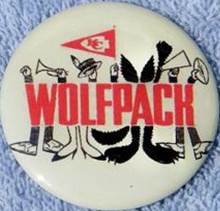
Bill and Lois: Since I was busy with law school and work, I did not initially join Bill and Jim in their next endeavor, the South and Eastern Jackson County Young Democrats. The club was a major force in the highly successful Committee for County Progress campaign in 1966 when its slate of candidates won many local and state offices.

Two members of the YD club got married on September 9, 1967. Bill Lochman and Lois Gleue.
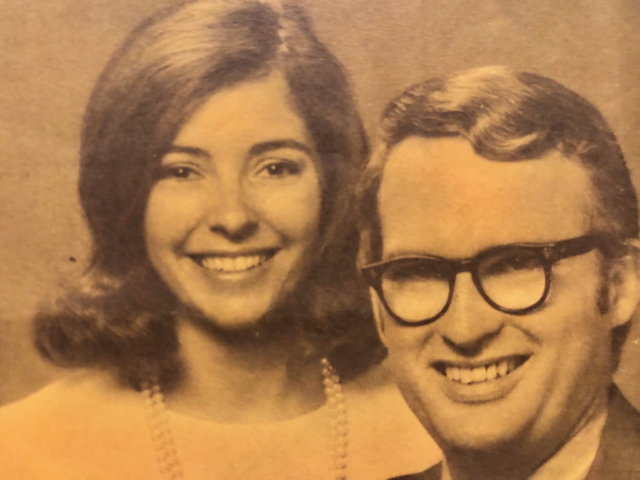
I quickly got to know Lois because I was a groomsman in the wedding, followed by merging into Lois and Bill’s social life in the…
Young Democrats: After I passed the bar in the fall of 1967, Bill and Jim recruited me to join their YD club. The president of the club was Pat Hininger, and her sister Roz had just married Ray Webb who I knew from law school. The next four presidents of the club were Ray, Bill, me and Roz.
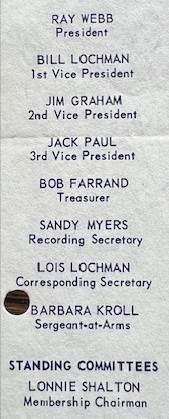
Our social and political lives became closely intertwined. In addition to local YD meetings and parties, we often traveled together to state YD functions and national YD conventions (Louisville and Little Rock).
Although they no longer had the Kansas City Star discount, Bill and Jim kept and expanded their Chiefs package to include other YD members – a total of 16 tickets in the North Stands. In 1969, we were rewarded with a Super Bowl season. On Christmas Day of 1971, in the last football game ever played at Municipal Stadium, we saw the Chiefs’ heartbreaking loss in the longest game in NFL history.
We felt like we had the best parties (not speaking of political parties), the biggest being an annual picnic at Lake Jacomo, which was a big draw for local and statewide politicians. Below, Jim Graham (center, in shades) serving up hot dogs at the picnic.
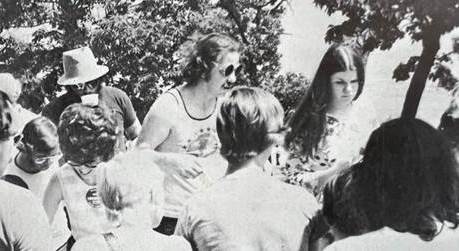
But there was lots of campaign work too. Door-to-door canvassing. Rallies. Voter registration. Yard signs and campaign posters. A lot of grunt work suited to “young” Democrats.
We had monthly meetings at the U-Smile Stadium Inn, and the parade of speakers included most local and state Democratic candidates and officeholders. A good example was in 1968 when we hosted a series of appearances by Senate candidates True Davis, Ed Long and Tom Eagleton (the latter winning our support). Several of our club members were also on the board of the Committee for County Progress, then the dominant Democratic organization in Jackson County.
During the 1968 campaign, Bill was a vice president of the club, and he and I worked on a presidential campaign questionnaire. The answers to the bad things were Richard Nixon and George Wallace. For the good things (like who supported civil rights), the answer was Hubert Humphrey. We modified the answer to one question to use a Nixon campaign slogan: ”Who vowed tearfully that he would never again run for office and be subject to humiliation by the press.” Answer: “Nixon’s the one.”
Humphrey lost, but many of the other candidates we supported won, including the rising star Tom Eagleton in his first of three successful Senate campaigns.
In addition to his work in the local YDs, Bill was a leader in the state organization. He was also an assistant editor of the state newsletter (partial masthead below):
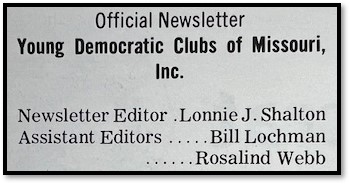
For several years, Bill served as national committeeman for the Missouri Young Democrats, and he and Lois were regulars at state and national YD conventions (below, Lois with Missouri YD president Bill Ferrell). In 1974, Bill was named Outstanding Young Democrat of Missouri.
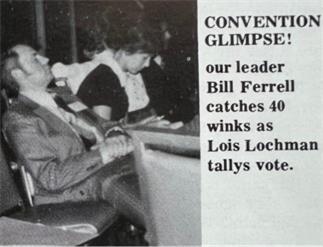
In 1970, our club was instrumental in gathering signatures for a home rule charter for county government. It passed, setting up 1972 as the first election for a 15-member county legislature. Bill threw his hat in the ring and won the Democratic primary for the 9th District seat (the Independence area). But 1972 was not a great year for Democrats in closely contested races. Nixon beat McGovern in Missouri by 400,000 votes, and Bill narrowly lost to his Republican opponent. In an even closer race, our CCP ally Mike White beat his Republican opponent in the 3rd District race by one vote (14,071-14,070).
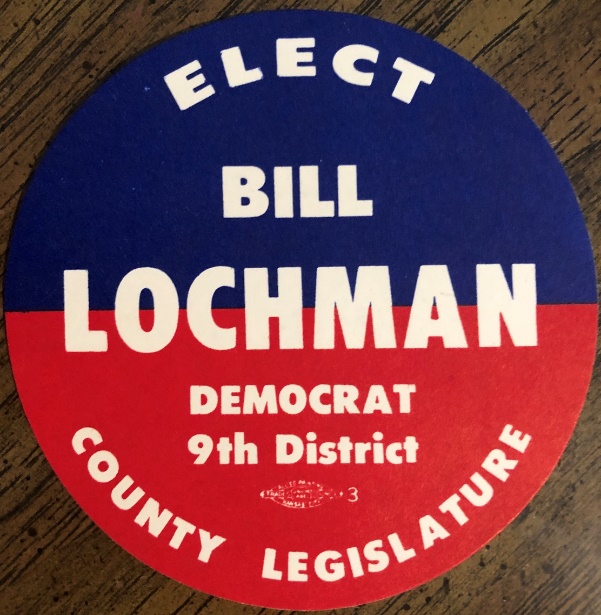
Bill’s Political Gift to Me: Bill’s mentoring placed me in the middle of county politics and led to my managing Mike White’s campaign for County Executive in 1974. Mike’s victory led to more political involvement, including chairmanship of the Jackson County Democratic Committee and advance work for Vice President Walter Mondale. But for Bill Lochman recruiting me to the YDs, combined with his enthusiasm and mentorship in the political process, I would not have had those opportunities. A gift that kept on giving.
Media Business: Most of Bill’s working career was in the media industry. He was a natural salesman because of his passion, smile, humor, smarts and the ability to talk about a variety of subjects (politics, history, culture, sports, rockets, etc.). He worked in sales and executive positions at local TV and radio stations (KCKN-AM, KMBC Channel 9, KCFM-FM and WDAF-AM 61 Country) and other media related companies.
The media business ran in the family. Bill’s brother Walt was a well-known station manager for local TV and radio stations. Their dad, also named Walt, was a household name in Kansas City in the 1930s and 1940s because he was the radio voice for the Kansas City Blues (as confirmed by my parents when they heard about my new friend Bill Lochman). I never met Bill’s dad who had died in 1954.
Walt Lochman started in radio in 1927, working for various stations as a singer, announcer, talk show host and administrator. In 1935, he approached Johnny Kling, owner of the minor league Kansas City Blues, to get permission to broadcast the games. Kling shared the worry of other baseball owners who were hesitant to employ radio because they thought it would hurt attendance. But Kling agreed to a 10-game test, and it was a smashing success. Walt Lochman would go on to broadcast over 1,000 games through 1942.
Below, at a 1939 exhibition game between the Yankees and their AAA farm team, the Blues. Lochman is interviewing brothers Joe DiMaggio of the Yankees and Vince DiMaggio of the Blues. Lou Gehrig was in the lineup that day for three innings, his last game ever. He left KC’s Union Station the next day for the Mayo Clinic where he would receive his diagnosis of ALS.
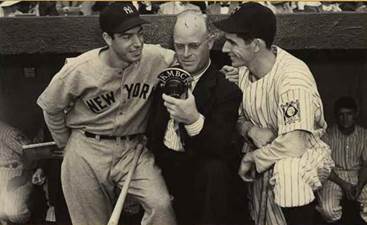
More details on Walt Lochman’s career are in Hot Stove #21 and Hot Stove #183. When I was researching for those posts, I saw a reference to a sound recording of a Blues game archived at the Marr Sound Archives at UMKC. I contacted Chuck Haddix, the Director of Marr, and he was able to find several samples. It was a real treat when Bill and I went over to Marr and heard his dad’s voice broadcasting Blues games and daily 5-minute sportscasts.
The Bar Business: I don’t know if it was the influence of the Young Democrats party crowd, but Bill, Ray Webb and I all ended up investing in bars. In the late 1970s, I was a co-owner of the Brewery in Brookside. Ray co-owned a bar downtown near the courthouse, frequented by lawyers and courthouse personnel. He called it “Up the Street,” so if he was there when someone called his law office, his secretary would say he was “up the street” and would call right back. The message would be relayed to Ray, and he called right back.
Bill also jumped in by opening a bar catering to the advertising world on the west side of downtown. His partners were from the ad industry, and he brought in Ray Webb for expertise. They called it the Downtown Office (“DTO” for short). Part of the plan was that customers could leave word at work that they were at the “downtown office.” Sort of like being “up the street.”
Bill and I looked at another bar opportunity in 1979. He had a friend who knew George Brett, and we worked on a proposal to own a bar with Brett. It was to be called “GB5” (as in George’s uniform number). We signed a contract, but the deal fell through. I still have the contract, signature page below.
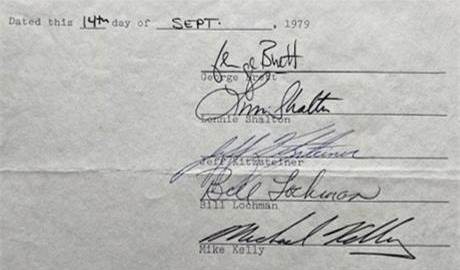
Bill, Ray and I were also part of a stock investment club we called Progressive Investment Group (affectionately known as “PIG”). Others from the YDs, including Jim Graham, and two of my Rolla fraternity brothers (Larry Brewer and David Woerner) were PIG investors. We put in like $25/month each and had monthly meetings in the conference room at the Popham firm where I was then working. With so little capital, we bought mostly penny stocks that rarely returned any dollars. But we laughed a lot.
Lonnie’s 50th Birthday Party: Rita threw me a 50th birthday party in 1991, and several old friends roasted me. Below, Bill creating laughs for Rita and me, probably making fun of my being a hot rod club member who could not change his oil or spark plugs.
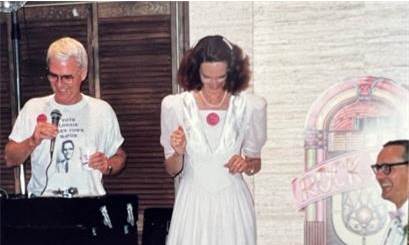
Bill is wearing a tee shirt that he and other 1959 Van Horn graduates had made for the evening. It has my yearbook photo and read “Vote Lonnie/Teen Town Mayor” The Van Horn crew also sang me a song to the music of “16 Candles,” but with new lyrics composed by Mike and Alice White. For example, as a substitute for the original lyrics “You’re the prettiest, loveliest girl I’ve ever seen,” Bill and his classmates sang that I was Rita’s dream and “You’re the oldest naked person that she’s ever seen.”
Bill’s 60th Birthday Party: In 2001, Lois threw a 60th birthday party for Bill. Larry Keck, our old friend from the Draggin’ Diplomats, was there, making it a mini reunion for our hot rod club. Bill had long ago lost track of his Draggin’ Diplomats license plate, and he got a nice surprise when Jim Graham brought his to give to Bill as a birthday present.
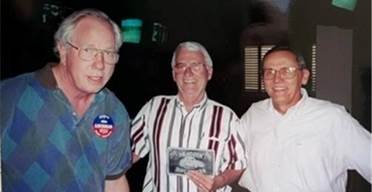
Van Horn Reunions: The Van Horn Class of 1959 had reunions every five or ten years. We also participated in some multi-class reunions, and for the one in 2006, Rita and I hosted some of the 1959 graduates at our condo.
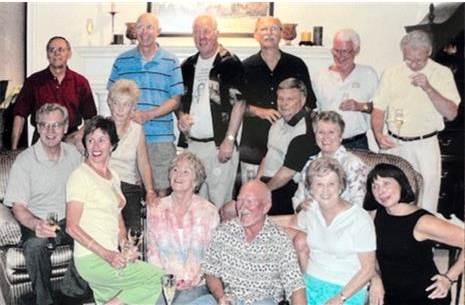
Standing: Lonnie Shalton, Tom Foley, Jim Graham (wearing his Vote Lonnie/Teen Town Mayor tee shirt), Brian Firkins, Bill Lochman and Bob Farrand.
Seated on Chairs: Tom Black, Leslie Gray, Don Russell and Shirley Maycock.
Seated on Floor: Linda Riley, Joann Norman, Jim Kirkham, Marcia Pippenger and Diana Sullivan.
The big reunion year was 2009, our 50th. Bill and I were on the reunion committee and spent a lot of time with others in locating class members. Chet Adkins was the organizer, setting up a spreadsheet of the contacts and sending out notices. This is the year I prepared the original Lonnie’s Jukebox with the help of Bill, Diana and Shirley. It featured 50 rock ‘n’ roll songs in chronological order mixed in with high school stories, some of which are told above. The full piece is here.
In 2019, we did it again for the 60th, but in a less formal fashion. Chet Adkins again took charge of the mailing list, and Bill organized the venue at V’s Restaurant. A good turnout, considering we were all turning 78 that year.
2024, the 65th? Don’t know. Not only have we just lost Bill, but Chet Adkins died in April. The 1959 class is turning 83 this year.
Family: Bill and Lois were married for 56+ years, and they lived in the same home in Independence for the last 50 years. They raised two fine children, Katie and Rob.
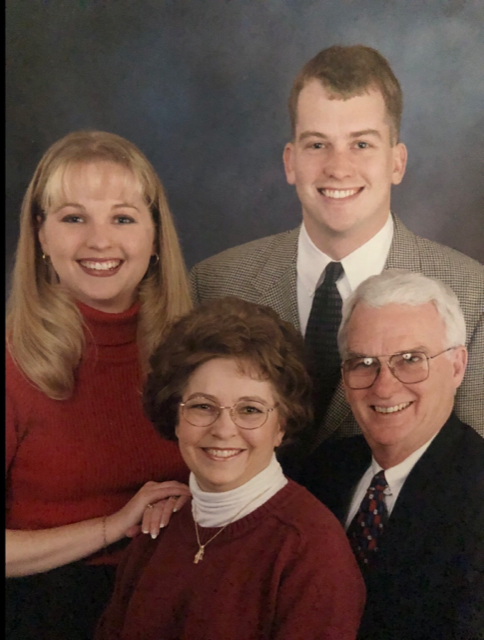
There are three grandchildren, and I still have Bill’s email blast when the twins were born, “Hey all, I am a proud new grandpa two times today – 10/7/10. Jayson Patrick, 5lb 13oz at 10:37 AM, and Henry Albert, 7lb 6oz at 10:40 AM. Mother, Leslie, and Dad Rob along with the twins are all doing well.”
Conversations with Bill: For the last decade or so, Bill and I have met monthly to talk teenage nostalgia, sports, politics, history, science, cars, current events, etc. He was an avid reader, especially of history, politics and science. He could explain the details on the evolution of batteries to run electric vehicles (he drove a hybrid and understood how it worked; as opposed to me, the guy who thinks electricity is magic). He insisted I buy a book he had read, The Space Barons, about billionaires Jeff Bezos and Elon Musk building the next generation of rockets. From high school physics class to the Air Force to the current day. Bill Lochman, Rocket Man.
We had retained our political views from the Hubert Humphrey days (pro-civil rights and pro-union) and embraced the progressive movements that followed (pro-choice, pro-gay rights, etc.). So, Elon Musk fell out of favor, rockets notwithstanding.
Initially, we met for Saturday lunch at Grand Street. Jim Graham often joined us.
In recent years, we have met for coffee at the Classic Cup, matching up with Bill’s regular haircut appointment near the Plaza. On occasion, there were guests. Below, earlier this year, Jim Kirkham, Lonnie, Brian Firkins and Bill.
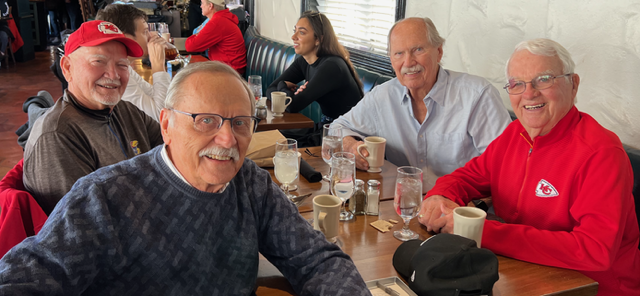
When our dear friend Jim Graham moved into a senior facility, we often visited him there. Below, giving Jim (a/k/a Santa Claus) a bulletin board of some of our mutual memories of Van Horn and the Draggin’ Diplomats. We later added other items, including Air Force missiles and Jim’s 1967 Corvette.
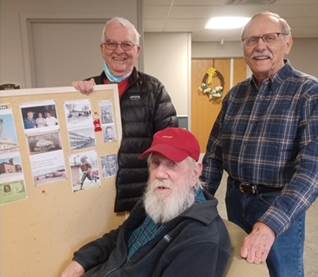
A few years ago, Bill told me he had a potential cancer growth in his lung, no doubt from many years of heavy smoking. He said he was more concerned about quality of life rather than quantity, so he opted to not consider surgery, chemo or radiation. He was content that he had lived a good and complete life, highlighted by his loving family.
And then a few years went by. Much more quality time and Saturday conversations than we had imagined. Finally, it caught up with him. Rita and I visited Bill in hospice the day before he died. He was unable to communicate with us, but there appeared to be recognition. So, we played some music from my phone. The first choice was of course “Lollipop.” We felt certain he was grinning. So, we kept going. “Party Doll.” “Rock Around the Clock.” “I’m Walkin’.”
Our long conversation ended too soon. RIP my friend.
Lonnie’s Jukebox – Bill Lochman Edition: Now for a setlist pulled from these Bill Lochman stories.
“Rock Around the Clock” by Bill Haley and the Comets (1955). An early rock ‘n’ roll anthem that helped launch out high school soundtrack.
“Maybelline” by Chuck Berry (1955). Cars, especially fast cars, were a common subject of the rock ‘n’ roll genre.
“I’m Walkin’” by Fats Domino (1957). Fats was a Teen Town favorite, along with Little Richard, Buddy Holly, Chuck Berry, Elvis Presley, etc.
“Lollipop” by the Chordettes (1958). The song playing on the car radio when Bill wrecked his mom’s Plymouth.
“Tijuana Jail” by the Kingston Trio (1959). The lyrics for the Bill Lochman and Jim Tally version, “So, here we are in the Corsicana jail. Ain’t got no friends to go our bail/So here we’ll stay ‘cause we can’t pay. Just sent our mail to the Corsicana jail.” The good news is that after one night in jail, they were bailed out.
“Party Doll” by Buddy Knox (1957). A #1 hit in 1957, but still on the jukebox in 1959 at the Big Six, one of our late-night haunts. The owners said people kept playing it, so no reason to update that slot in the jukebox.
“Kansas City” by Wilbert Harrison (1959). The song that prompted us to head to Vine Street and enjoy Dizzy Gillespie at the Blue Room.
“Shake Rattle and Roll” by Big Joe Turner (1954). When we were at the Blue Room, we did not realize that blues shouter Big Joe Turner got his start just around the corner. Turner had the first hit of this song – on the rhythm and blues charts – followed by the one we knew by Bill Haley and the Comets.
“Running Bear” by Johnny Preston (1959). This #1 hit carried over into 1960 and was part of the soundtrack for our second American Graffiti summer.
“Mustang Sally” by Wilson Pickett (1966). My first state YD convention with Bill was in Jefferson City in 1968. There were huge party nights around the pool, and I remember the band played from a balcony and featured covers of songs by Wilson Pickett and Mitch Ryder and the Detroit Wheels (“Devil with a Blue Dress On”). I’m picking “Mustang Sally” from the setlist because it matched a raffle held by our club at the convention. Hundreds of tickets were sold. The winner won a Mustang with a red interior. We also touted that it had four-on-the-floor. The winner was surprised when the prize was a black horse (in a trailer in the parking lot).
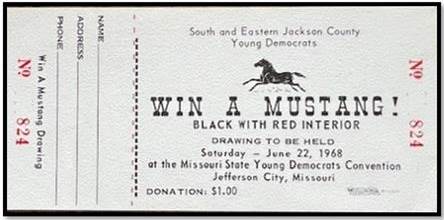
“Time Won’t Let Me” by the Outsiders (1966). Lois tells me this was their song. It came out in 1966 and, contrary to the lyrics, Bill and Lois did not “wait forever” – got married the next year.
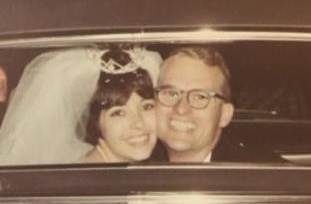
Photo Gallery: Bonus pics.
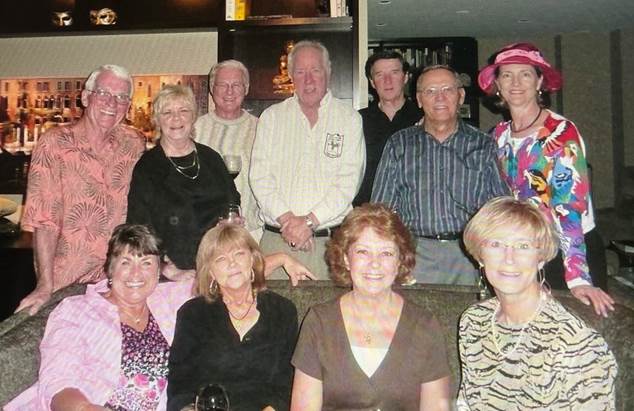
A 2010 reunion of our Young Democrats club.
Standing: Bill Lochman, Roz Webb, Bob Farrand, Jim Graham, Ted Folkert, Lonnie Shalton and Rita Leifhelm.
Sitting: Carolyn Hall, Pat Hininger, Lois Lochman and Sonia Farrand.
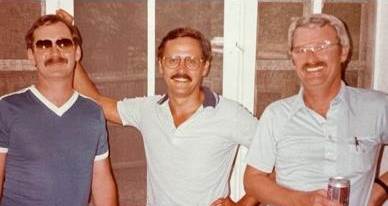
Larry, Lonnie and Bill, at a pool party at Rita’s and my home at 1401 W. 50th. I met Larry Brewer when I pledged Sigma Nu Fraternity at Rolla. In our sophomore year, I introduced him to Diana Sullivan. They have been married 52 years.
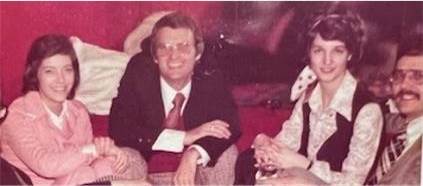
Lois, Bill, Rita and Lonnie